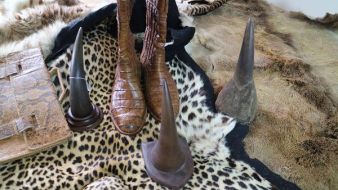Police visit more than 300 businesses at risk of trading in endangered species
Police officers have visited more than 300 businesses at risk of trading in endangered species, as part of a year-long campaign to tackle wildlife crime in Scotland.
Items including ivory jewellery, fur coats and animal skin handbags were seized on suspicion of being sold illegally.

This action, which started in October, kicked off Operation Wingspan, a 12-month campaign, which will focus on the seven wildlife crime priorities set by the UK Wildlife Crime Tasking and Co-ordination Group and the National Wildlife Crime Unit.
During phase 1 of Op Wingspan officers visited premises including antique dealers, retro clothes and pet shops across Scotland, to advise owners and provide information about potential contraventions of the Convention on International Trade of Endangered Species (CITES).
This activity supported Operation Thunder, an international police and border agencies enforcement operation, coordinated by INTERPOL and the World Customs Organization (WCO), to tackle the Illegal trade in protected and endangered species.
Op Wingspan phase two tackling badger persecution, is running now until end of January 2021. The charity Scottish Badgers will be working with Police Scotland to support officer training and in the identification and protection of vulnerable sites.
Detective Chief Superintendent Gary Cunningham, lead for Wildlife Crime, Police Scotland said: “Most shop owners we visited during this first phase of our campaign recognised their responsibility in preventing the trade in endangered species. While a number of items were seized, these are undergoing tests to establish their legality.
“CITES is one of seven wildlife crime priorities identified in the UK. The others are much closer to home and are about protecting our native species from persecution and helping them thrive unharmed.
“Over the course of the next 10 months we will be focusing on each of the wildlife crime priorities, working with our partners and within local communities to raise awareness, protect wildlife and prevent crime.”
The campaign will be delivered through a mixture of operational policing activity, internal training, strong partnership working and action to raise public awareness of the seven priorities of wildlife crime, these are:
Convention on International Trade of Endangered Species (CITES)
Badger Persecution
Bat Crime
Freshwater Pearl Mussels
Poaching (Deer poaching/coursing, fish poaching and hare coursing)
Raptor Persecution
Cyber Enabled wildlife crime
DCS Cunningham added: “Scotland’s vast, beautiful habitat is home to internationally renowned species that attract thousands of nature lovers and tourists every year. However, there are those who seek to either destroy this natural habitat or kill protected species illegally for their own personal gain or even ‘sport’.
“Crimes committed against wildlife are often cruel and barbaric, from using poisons or snares to hunting deer or badgers with dogs – the injuries they inflict can often result in slow, painful deaths.
“Reports of wildlife crime doubled during lockdown. Increased reporting is to be welcomed but we will continue to work closely with a wide range of partner organisations to reduce the harm to species targeted by criminals and the communities who rely on them for employment and tourism across Scotland.”
Alan Roberts from the National Wildlife Crime Unit said: “The work done so far under Operation Wingspan has undoubtedly raised awareness of wildlife law within Scotland as well as contributing to investigations and enforcement activity on a much broader scale. It is likely to make a wide-ranging and long-lasting contribution to the UK’s work to combat wildlife crime.”
A spokesperson from Scottish Badgers said: “Every year at Scottish Badgers we receive a high volume of enquiries from members of the public with concerns about badger crime, and not knowing what constitutes as one. Badgers and their setts have legal protection, and it is an offence to cause damage or disturbance in any way to both.
“In the case of any obvious crime, the Police should be notified at the first instance, however if there’s any uncertainty you can get in touch with Scottish Badgers to discuss and for advice.”
For further information about wildlife crime in Scotland visit www.scotland.police.uk/wildlifecrime